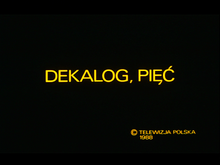- Decalogue V
-
Decalogue V 
DVD posterDirected by Krzysztof Kieślowski Produced by Ryszard Chutkovski Written by Krzysztof Kieślowski
Krzysztof PiesiewiczStarring Miroslaw Baka
Jan Tesarz
Piotr GlobiszMusic by Zbigniew Preisner Cinematography Slawomir Idziak Editing by Ewa Smal Distributed by Polish Television Release date(s) 1988 Running time 57 min. Country Poland Language Polish Budget $10.000 The Decalogue - V (Polish: Dekalog, pięć) is a fifth part of the television series The Decalogue by Polish director Krzysztof Kieślowski, connected to the fifth imperative of the Ten Commandments: Thou shalt not kill. A brutal and seemingly motiveless murder brings together a young drifter Jacek (Mirosław Baka), a taxi driver (Jan Tesarz), and an idealistic lawyer Piotr (Krzysztof Globisz). This is the only one of the films with an explicit political stance, reflecting Kieślowski's opposition to the death penalty. An expanded 84 minutes cinema version of this episode was released as Krótki film o zabijaniu (A Short Film About Killing). [1]
Contents
Plot
The film begins with Piotr Balicki (Krzysztof Globisz), a young and idealistic lawyer who is about to take the bar exam. Jacek Łazar (Miroslaw Baka) is a 21 year-old man, coming from the countryside. He wanders the streets of Warsaw and has apparently nothing to do he keeps asking about a taxi stand but the first one he finds is very busy. Waldemar Rekowski, a middle-aged taxicab driver (Jan Tesarz), overweight, cruel-looking, he lives in the Dekalog apartment block. He enjoys the freedom of his profession, a living wage and the power to ignore people whom he does not want to take into his taxi and ogling young ladies.
Jacek makes dirty jokes on people like throwing a stranger who intended to hit on him into the urinals on a public toilet, dropping stones from a bridge on to passing vehicles, causing an accident there or shooing pigeons, which an old woman wants to feed. He has a photograph of a little girl blown up and then goes to a cafe. The taxi driver wanders around the city looking for a fare. Jacek keeps a length of rope in his bag and a stick; he wraps a bit of rope around his hand but stops when he spots two girls playing at the other side of the window at the cafe and he engages in a game with them. He then goes to a taxi stop and jumps into a taxi. Jacek asks to be driven to a part of the city near the countryside. Jacek kills the driver using the rope, but he is not successful and has to finish his killing using a big stone. He then takes the taxi to the river and prepares to dump the body. Jacek turns on the radio and a children's song can be heard, which clearly upsets him.
Jacek is imprisoned and talking to his lawyer Piotr, for whom this is a first case after he has finished his studies. There is neither much evidence nor motive for this murder, Piotr has no chance defending his young client although he is told that his arguments and legal strategy were rather convincing the outcome could not have been any different. Jacek gets the death penalty and will be hanged. Before the time of execution Jacek reveals that his baby sister died in an accident caused by a truck that his friend had been driving under the influence and he never recovered from this, he asks to be buried next to her and the blown up photo given to his mother.
The execution time has come, Jacek is held by at least six policemen on the way to his execution, chained by hands and legs. The judgment itself is performed with no less coldness than the act committed by Jacek.
Cast
- Mirosław Baka - Jacek
- Krzysztof Globisz - Piotr
- Jan Tesarz - taxi driver
- Zbigniew Zapasiewicz - police inspector
- Barbara Dziekan-Wajda - cashier
- In other roles
- Aleksander Bednarz, Jerzy Zass, Zdzisław Tobiasz,
Artur Barciś, Krystyna Janda, Olgierd Lukaszewicz
Cast notes
- From actors, who appeared in other episodes, we can briefly see the pair from Decalogue II, Krystyna Janda (Dorota) and Olgierd Lukaszewicz (Andrzej)
References
Decalogue I • Decalogue II • Decalogue III • Decalogue IV • Decalogue V • Decalogue VI • Decalogue VII • Decalogue VIII • Decalogue IX • Decalogue X
Directorial works of Krzysztof Kieślowski Feature films Personnel · The Scar · The Calm · Camera Buff · Short Working Day · Blind Chance · No End · A Short Film About Killing · A Short Film About Love · The Double Life of Véronique · Three Colors: Blue · Three Colors: White · Three Colors: RedThe Decalogue Short films Related topics The Three Colors Trilogy Cinema of Poland
Cinema of PolandFilms A–Z • Chronology of films • Interwar • Pre 1930 • 1930s • 1940s • 1950s • 1960s • 1970s • 1980s • 1990s • 2000s
Actors • Directors • Cinematographers • Composers • Editors • Producers • ScreenwritersCategories:- Polish films
- 1988 films
- Films directed by Krzysztof Kieślowski
- Polish-language films
Wikimedia Foundation. 2010.


